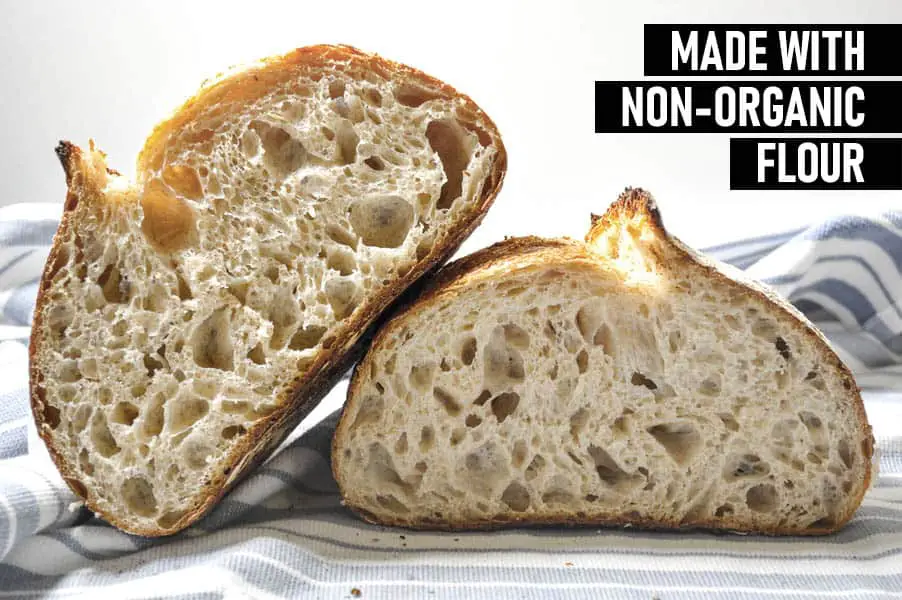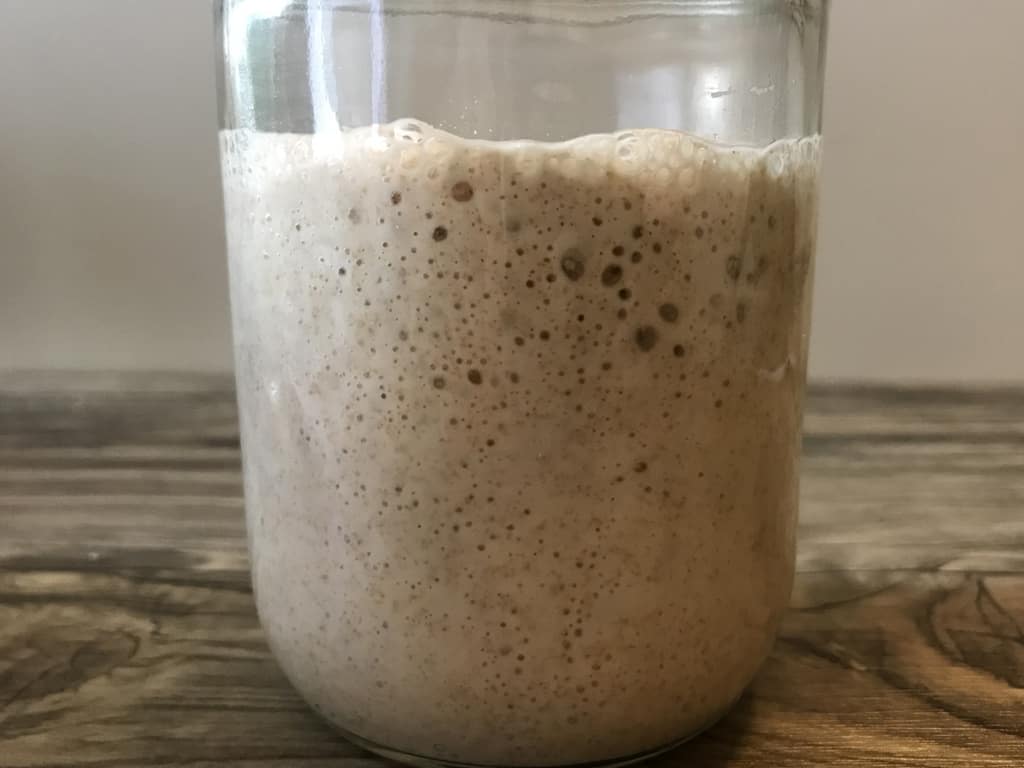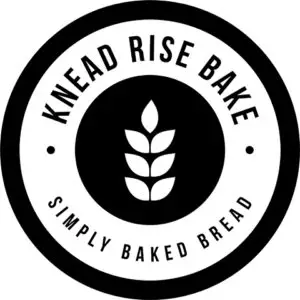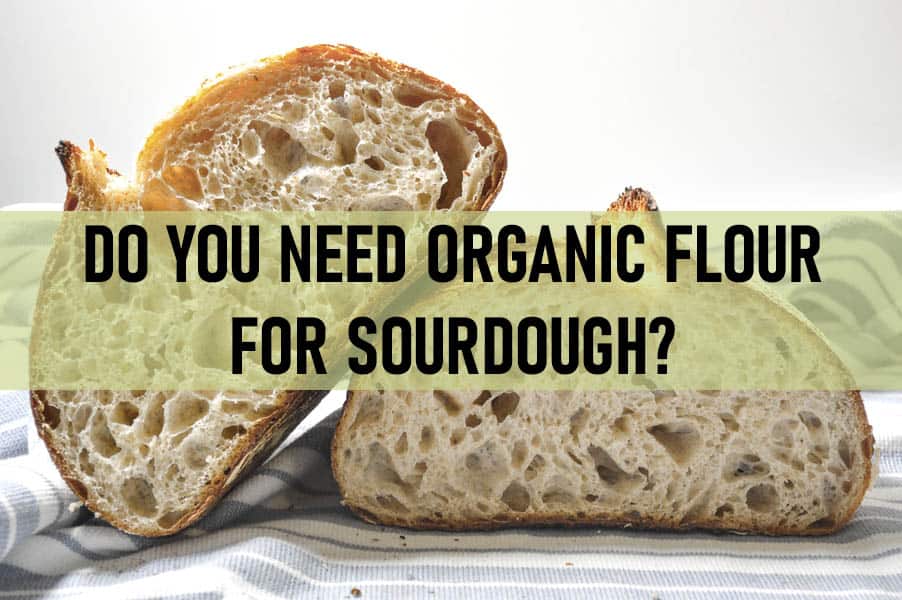There are a lot of strategies and methods floating around in the bread world, most of which come down to preference. When it comes to using organic flour in sourdough it largely falls in the preference category.
However, there are some pretty strong arguments for using organic flour in sourdough. We’ll get to those in just a moment. But, let’s just takle the question you came here for. Do you really need organic flour to make sourdough?
Organic flour is not necessary to make sourdough. Any wheat flour that has a moderate level of protein, which turns into gluten, will produce a quality loaf of sourdough. In fact, some non-wheat varieties of flour can even be used to make sourdough. The primary nutrition needed in flour to make sourdough bread is water, starch, and protein.
Organic Flour is Good but not Needed
As I said above, there are some strong arguments for using organic flour. Some of them actually have to do with the nutritional value, especially the presence of beneficial bacteria. There is reputable research that suggests that non-organic flour has around 75% fewer bacteria present during fermentation than organic varieties (Source).
Additionally, in the same study, organic flour produced a better texture in the crumb of a finished loaf as well as better color in the crust. On top of that, organic flour also produced better volume. We love better volume! The only thing better than bread is more bread.
With that, if you have access to organic flour and can afford it, we’d suggest using it. We like to use organic when we can get it, as it can produce a better loaf of bread. But that is the key here, organic can produce better sourdough bread. Note that better implies non-organic can produce bread too. 🙂
The hard truth in the study above is that the best bread was actually produced by organic flour that had no added inputs. Meaning, nothing was added to the soil or plant, such as fertilizers.
Wheat grown in that manner (as noted by the researchers) doesn’t work on the consumer level. In other words, that kind of flour isn’t on the market. And it likely will not be on the market as it is too expensive to produce. Additionally, farmers would not be able to produce enough for demand.
So essentially, the best loaf of sourdough is all but impossible to attain for most of the world. But that doesn’t mean bakers using store-bought organic flour should just give up. Nor does it mean non-organic flour can’t produce sourdough bread.
Many folks, especially those in regions of the world where bulk non-organic flour is all that is available will be able to produce an amazing loaf of homemade sourdough bread. There is no reason to assume or suggest that organic is needed to make sourdough. It isn’t needed.
There is enough room at the homemade bread table for everyone. Bring some organic or non-organic and I’ll eat them both. Just pass me some honey please!
How Much Better is Organic?

In our own home, we do not find a major difference between the two types of flour in our finished loaves. Our baked loaves tend to have better-looking crusts with organic flour, but other than that, we don’t see a big difference. We like using organic, but only get it when on sale.
But better in and of itself is hard to define. What makes it even more complicated to really gauge is that many flours available on the market add ingredients to their flour. Those ingredients make the flour better for volume and texture. This is likely why at the consumer level and in our kitchen there isn’t a distinct difference. That is unless comparing storebought non-organic flour to something that is locally sourced from a mill down your street.
In general, though, we like using crumb and volume as a gauge for better.
And the best bang for your buck to improve those qualities, in our opinion, will come down to protein content.
Something around 11 percent to 12 percent for sourdough is ideal. Most all-purpose flour will get you around 9 to 10 percent. This is good enough, but bread flour is better, as it increases the gluten content to that 11-12 percent mark. That increase will result in a better crumb and volume.
In our experience, going from a low protein flour to a high protein flour will improve texture and volume more than organic to non-organic will.
But again, all-purpose will produce a fine loaf of sourdough. Which is why all-purpose and bread flour can be used interchangeably in baking. If you want more on bread flour and all-purpose, we have a post on that here.
I will add, that using specialty flours like those found at local mills will make a distinct difference in your bread texture and flavor. But, that likely has more to do with the variety of wheat and freshness of it than differences in organic or non-organic farming practices. In short, there are a lot of variables when it comes to flour on the market.
Clearly, the research shows organic is better, but isolating the variables on the consumer level is hard to do, making it tough to see the real impacts of organic vs non-organic flour on bread.
What About Sourdough Starter?

Everything that is needed to leaven sourdough bread translates to starting and keeping a starter healthy. In other words, if the flour is sufficient for making sourdough bread, it is sufficient for feeding a starter.
Which would mean that non-organic flour is perfectly acceptable for feeding and maintaining a starter. It’s even acceptable for starting a starter.
That’s because all of the nutrition needed for yeast to want to make their home in a starter will be present in non-organic flour and water.
We’ve seen some signs that unbleached flour might impact a starter, but then at other times have seen no difference. Because of that we suggest avoiding bleached flour when starting a starter as a kind of insurance, but it isn’t needed either.
You can see our recipe and guide for creating a sourdough starter here. It’s super simple and uses just water and whole wheat flour. Even better, it takes just 7 days on average to be ready to bake with.

